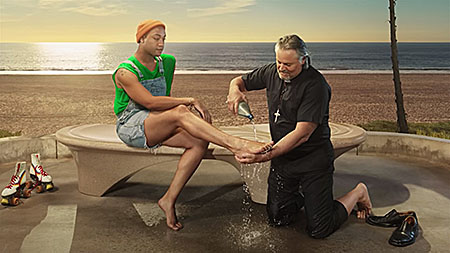
As you’ve probably guessed, my title comes from two controversial ads broadcast during the 2024 Super Bowl. Since they were aired, there has been a flurry of negative commentary on them from those proclaiming themselves Christians on antisocial media. Many of those folks have gone so far as to label the ads as satanic.
Curious about what all the hubbub was about, I watched the commercial on YouTube, then listened to some of the criticisms about it. I’ve witnessed way too many off-the-cuff condemnations of ministries and ministers on the interwebs made by folks using out-of-context sound-bites and equally out-of-context Scripture quotes to serve their own personal religious agendas, so I wanted to see it all for myself firsthand.
I immediately felt led to write this article. My goal is to provide you with something truly useful for your own evaluation of this matter as well as similar ones which may arise in the future. I intend to provide a “fair-and-balanced” viewpoint as they say on Fox News, one devoid of the reactionary rhetoric we’ve witnessed thus far. In other words, I’m not going to tell you how to think about the whole issue, but will leave the final judgment between you and the Holy Spirit, whether you are a Christ-follower or not.
The Ad Itself
Here is the ad in its entirety:
AUTHOR’S NOTE: If your browser refuses to play it within this page, click this link to view it on YouTube.
As you have seen, we have a series of still images, most of which depict folks washing other people’s feet. For those of you who care about such matters, it is obvious each image was generated by an AI. Here are the scenes in order of appearance:
- A son washing his father’s feet in the family home’s dining room
- A police officer washing the feet of a gangbanger in a nasty alley somewhere
- A female cheerleader type washing what appears to be a social outcast’s feet at a high school
- A cowboy washing the feet of a Native American man somewhere in the desert
- A middle-aged woman washing the feet of a young woman outside a family planning clinic with Pro-Life protestors gathered in the background
- A young woman washing the feet of an alcoholic woman in the trashed-out kitchen of her slum dwelling surrounded by empty booze bottles
- A male oil worker washing the feet of a female Asian climate activist in the middle of an oilfield
- A suburbanite woman washing the feet of an illegal immigrant
- A housewife washing the feet of a Moslem woman in front of both their husbands outside a house
- A young black woman washing the feet of a comparably aged white woman in the midst of a heated free-speech protest
- Two elderly men, one black, the other white, seated on a rickety front porch somewhere in the Deep South. They both have one of their feet in a washtub, thus implying they have completed their foot washing ceremony
- The final scene is of a man dressed in clerical garb, obviously a pastor from a mainline denomination (most of whom are ultra-liberal), who is washing the feet of a gay and/or transgender person
The ad ends with the animated words, “Jesus didn’t teach hate. He washed feet. He gets us. All of us.”
When you visit their website, the homepage displays the animated words:
How did the story of Jesus, the world’s greatest love story, get twisted into a tool to judge, harm, and divide?
How do we remind people the story of Jesus belongs to everyone?
These questions are the beating heart of He Gets Us.He Gets Us
All of which begs the question, “what could possibly be wrong with all that?”
On the surface, it seems like they are making excellent points and asking some crucial questions. So why all the controversy? We’ll now take a deeper dive into their message and you can decide for yourself.
My Thoughts
On One Hand…
Here is some scriptural context: regardless of where you may stand on the practice of foot-washing ceremonies in the modern day, the practice was originally exemplified by Jesus Himself in the upper room during His last supper with His disciples prior to His arrest, trial, torture, and execution. We find the account in John 13.
Jesus, knowing that the Father had given all things into His hands, and that He had come from God and was going to God, rose from supper and laid aside His garments, took a towel and girded Himself. After that, He poured water into a basin and began to wash the disciples’ feet, and to wipe them with the towel with which He was girded…
So when He had washed their feet, taken His garments, and sat down again, He said to them, “Do you know what I have done to you? You call Me Teacher and Lord, and you say well, for so I am. If I then, your Lord and Teacher, have washed your feet, you also ought to wash one another’s feet. For I have given you an example, that you should do as I have done to you. Most assuredly, I say to you, a servant is not greater than his master; nor is he who is sent greater than he who sent him. If you know these things, blessed are you if you do them.”
John 13:3-5;12-17
Back in that day in that neck of the woods, people either wore sandals or walked barefoot. In an era of dirt roads shared with herds of cattle, sheep, and goats — not to mention beasts of burden such as horses, donkeys, and camels — all of which were eliminating themselves as they travelled the same road, you can imagine how nasty folks’s feet got from walking on these surfaces.
So when people entered someone’s house, the host would task the lowest-ranked servant or slave in his staff to wash his guests’ feet. In the second chapter of John’s gospel where he recounted Jesus turning water into wine at the Cana wedding, the water jars used for that miracle were actually dedicated to this very purpose.
Jesus’ behavior was the ultimate act of humility. Here we have God-in-Sandals, the Creator of the Universe, stripping off His robe, assuming the role of the lowliest slave in the house, kneeling on the floor to wash the filthy feet of humans corrupted by sin. You know the rest: he went on to die for those selfsame sinners, including the likes of us.
Jesus spent a lot of time and effort ministering to the outcasts of His time. I’ve addressed that issue in serious depth in my previous article about the Prodigal Son parable entitled “The Bad, The Dad, and the Ugly.” You can and should read that at your leisure to give you a more complete context for my comments here.
 From my perspective, it appears the He Gets Us folks have achieved pretty much what Jesus did that day in that Luke 15 account: reached out in loving mercy to the disenfranchised while simultaneously offending the religious folks of the time. The Pharisees present that day were expecting Jesus to condemn the sins of that crowd of tax collectors and notorious sinners present and then issue a demand for repentance. Instead, Jesus gave that crowd of outcasts hope of restoration to a merciful Father while illustrating to the Pharisees they themselves were no better than the targets of their condemnation.
From my perspective, it appears the He Gets Us folks have achieved pretty much what Jesus did that day in that Luke 15 account: reached out in loving mercy to the disenfranchised while simultaneously offending the religious folks of the time. The Pharisees present that day were expecting Jesus to condemn the sins of that crowd of tax collectors and notorious sinners present and then issue a demand for repentance. Instead, Jesus gave that crowd of outcasts hope of restoration to a merciful Father while illustrating to the Pharisees they themselves were no better than the targets of their condemnation.
Interestingly, the selfsame criticisms made by the Pharisees that day towards Jesus have been leveled at the He Gets Us folks, claiming they are condoning sin by not calling for repentance in the ad. Tragically, by their very criticisms, the Internet Pharisees are proving the precise point both Luke 15 and the ad are trying to drive home.
The problem here is not Christianity itself, but those religious folks — pietists, if you will — who inhabit Christendom, the organized, yet corrupted-by-man’s-religion, expression of Christianity in the earth. Pietism is anathema to the Gospel. Form without surrender. Zeal without compassion. Truth without grace. Judgment without mercy. Pietists exhibit few, if any, of the characteristics God calls for in what has been my personal theme verse for the last few years:
He has shown you, O man, what is good; and what does the Lord require of you but to do justly, to love mercy, and to walk humbly with your God? Micah 6:8
He has told you, O man, what is good; and what does the Lord require of you except to be just, and to love [and to diligently practice] kindness (compassion), and to walk humbly with your God [setting aside any overblown sense of importance or self-righteousness]? Micah 6:8 AMP
 Tragically, such pietism is what the lost-and-dying world sees as Christianity these days — and has seen for decades, if not centuries. And they justly reject its premises for the hypocritical farce that they are. Far more tragically, they also tar those of us who are genuinely sold out to Christ, those who take His command to humbly love others seriously, with the same brush.
Tragically, such pietism is what the lost-and-dying world sees as Christianity these days — and has seen for decades, if not centuries. And they justly reject its premises for the hypocritical farce that they are. Far more tragically, they also tar those of us who are genuinely sold out to Christ, those who take His command to humbly love others seriously, with the same brush.
In every Gospel account I can recall, Jesus loved on the sinner first and the sinner repented afterwards. He only confronted folks over their lack of faith after He performed the necessary miracle.
Points-of-fact:
- Jesus, knowing Judas was about to betray Him, washed his feet anyway.
- Jesus, knowing full well Peter would deny Him 3 times before the night was out, washed his feet anyway.
- Knowing the rest of the disciples except John would all abandon Him during His pending ordeal, He washed their feet anyway.
Paul summarized it unequivocally in Romans 2:4: “…the goodness of God leads you to repentance.” Not His anger at sin, not His disappointment with our failures, not a declaration of His holiness (all of which are valid foundational truths in their own right), but His goodness. “Oh, give thanks to the Lord , for He is good! For His mercy endures forever.” (see Psalm 118:1)
In my experience with my own addiction as well as that of other addicts, no one needed to tell us we were low-down, rotten, good-for-nothing sinners; we already had that fact tattooed on the inside of our eyelids, so that was no news to anyone of us.
What we desperately needed to hear was the Good News: “Jesus accepts me who I am, as I am, where I am. He also loves me way too much to leave me there.” So we believed His message to the point we surrendered to His love, and then repented of our sins. And we got free by the grace of God. And we stay free by the grace of God. And we will remain free until we depart this planet, again by the grace of God.
That’s how the Gospel works.
This is the compassionate message the lost desperately needs to hear and have us demonstrate towards them, yet that essential signal is almost completely drowned out by the noise of modern-day Phariseeism.
On the Other Hand…
I’ve heard — and tend to agree with — an interesting observation made about the scenes portrayed in the ad: most of them portray the foot-washing recipients as folks that woke progressives have labelled as “victims of oppression.”
Here’s what I mean: nowhere do we see anyone washing the feet of someone sporting a MAGA hat. Or the feet of a man with a firearm at a shooting range. Or an evangelical pastor’s feet being washed by a congregant. Or an oilfield worker by a climate activist. Or a police officer or other first responder by a citizen. Or a member of our military by a civilian. Or a redneck by a hipster. Or any other person who could be ideologically labelled as religiously/politically conservative or representative of “The Establishment” having their feet washed by anyone from the so-called “oppressed classes.”
You see, Jesus loves all those folks, too, just as much as those so-called “victims” portrayed in the ad. Indeed, He even died for the pietist Internet Pharisees who are all bent out of shape by its message.
And that is the true message of the Gospel: there are no “oppressed classes” in God’s sight, only us spiritually clueless rebels completely incapable of saving ourselves, all of whom desperately need His rescue. He died for everyone portrayed in that ad — and a whole bunch more!
So beware of social justice rhetoric masquerading as the Gospel. There’s a bunch of it floating around pop culture nowadays.
Whether the ads we’ve been discussing qualify as such is up to you to prayerfully decide for yourself.
In the mean time, obey Jesus’ call to serve others, no matter who they are.
If called upon by the Holy Spirit, even wash their feet.
Thanks for reading!

